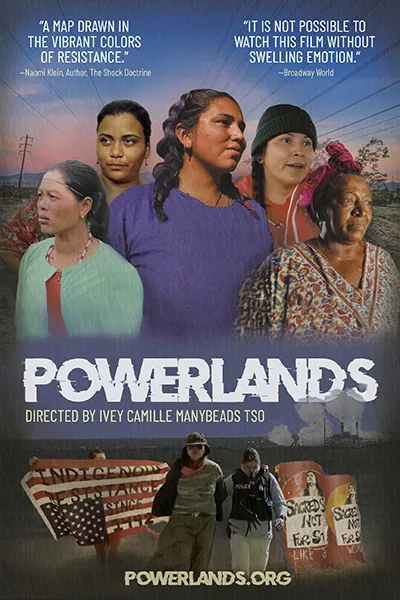Indigenous Resistance and Resilience: Symposium to Raise Awareness of Resource Extraction on Navajo Land

In Powerlands, a young Navajo filmmaker investigates the displacement of Indigenous people and the environmental devastation caused by chemical companies on the same land where she was born.
Assistant Professor of Environmental Studies Adrienne Benally (Diné) has been teaching at Swarthmore with a focus on Indigenous communities since 2021. Her scholarship focuses on the impact and politics of resource extraction on the Navajo Nation, of which she is an enrolled member.
“Students are interested and eager to learn more about Native American and Indigenous peoples,” says Benally, who notes that the College’s new strategic plan seeks to enable the “growth of Native and Indigenous Studies as an area of focus in environmental studies.”
With that in mind, she and Professor of Environmental Studies and Coordinator of Environmental Justice Giovanna Di Chiro have planned a symposium called “Resisting Extraction and Building Resilience on the Navajo Nation: Stories from Diné Leaders, Artists, and Activists” alongside Danika Grieser ’26, Adina Shane ’27, and Karla Estrada Garcia ’26.
The symposium begins with a screening of the film Powerlands (directed by one of the symposium speakers, Ivey Camille Manybeads Tso (Diné)) on Thursday, April 25 at 5 p.m. in Chang Hou Hall (SCI 101). The events of Friday, April 26th will include speaker presentations, poetry readings, and a roundtable discussion, and take place from 1 to 4:00 p.m. in SCI 101. A reception outside the lecture hall in the Eldridge Commons will follow.
“We hope the symposium offers insight and perspective into cross-generational advocacy work being done to raise awareness about and resist the ongoing colonial impacts of extractive industries on tribal lands, in this case specifically the Navajo Nation,” says Di Chiro.
The Navajo Nation, which spans 27,425 square miles across four states — Utah, New Mexico, Arizona, and Colorado — sits on a wealth of natural resources including uranium, coal, and natural gas. A history of mining on the reservation “has left a legacy of profound environmental, social, spiritual, and cultural impacts on the Navajo (Diné) people, and that continues today through ongoing resource extraction,” says Benally.
They seek to raise awareness about the issues and to amplify the diverse advocacy efforts of Diné activists with a focus on intergenerational and creative resistance.
“This symposium allows us to bring forward Indigenous-centered voices and experiences,” says Di Chiro, “and hopefully provides insight into multidimensional forms of activism and Indigenous environmental justice that are important in a diverse and complex world.”
The four speakers highlight this diversity. Dr. June Lorenzo, Laguna and Diné, is an attorney and consultant with an extensive career practicing law and human rights advocacy work on behalf of Indigenous peoples. Duane “Chili” Yazzie, Diné, is a farmer, community organizer, respected Navajo Nation elected leader, and lifetime activist on the Navajo Nation. Kinsale Drake, Diné, is a published poet, editor, and playwright whose debut poetry collection, The Sky Was Once A Dark Blanket (University of Georgia Press, 2024), has received numerous awards. Ivey Camille Manybeads Tso, Diné, is an award-winning documentary filmmaker whose first feature film, Powerlands (2022), has won numerous awards.
In Powerlands, a young Navajo filmmaker investigates the displacement of Indigenous people and the environmental devastation caused by chemical companies on the same land where she was born. On this personal and political journey, she learns from Indigenous activists across three continents.
Benally hopes the symposium will “illuminate diverse and dynamic forms of Indigenous activism reaching across generations and communities of people.”



